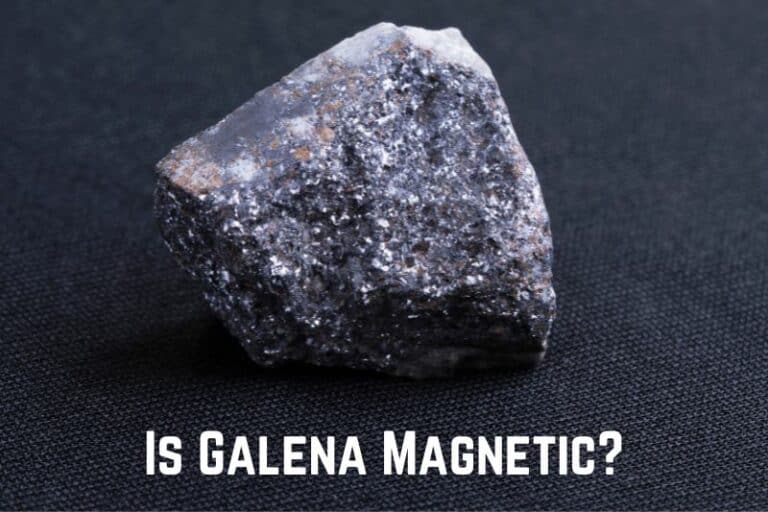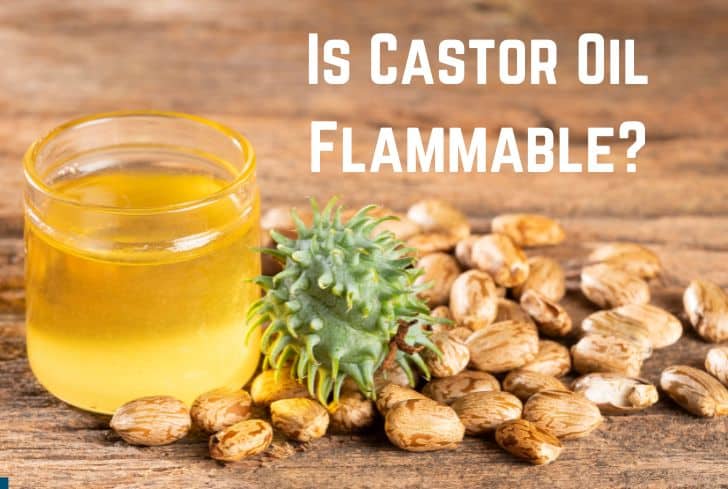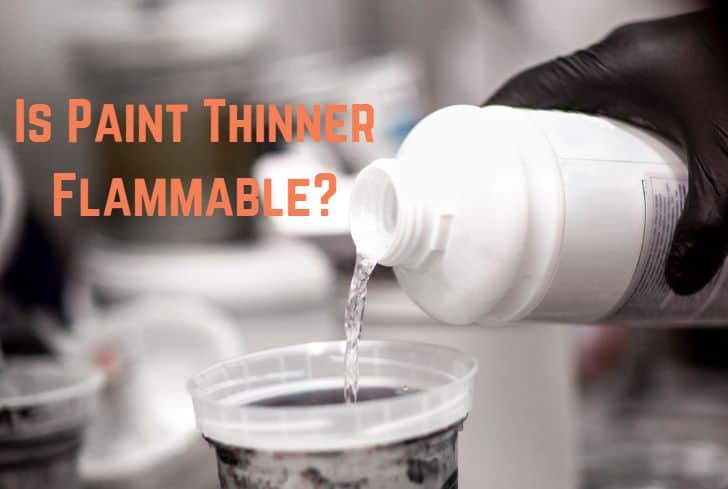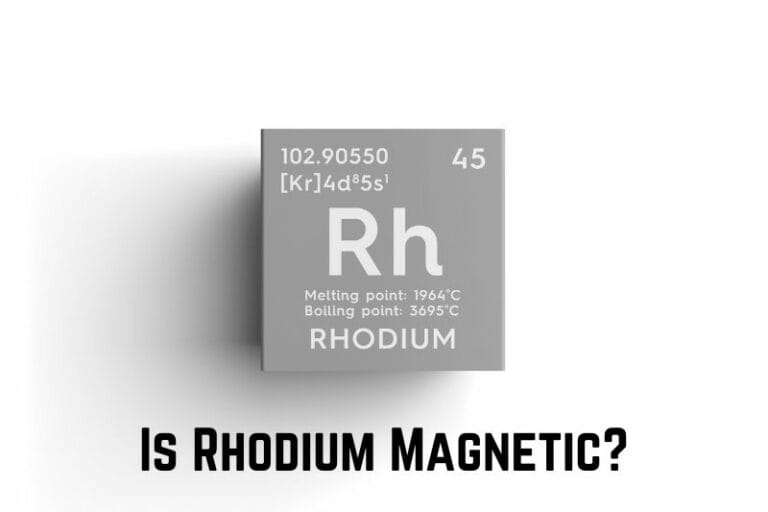How Long is Spilled Gas Flammable? (Explained)
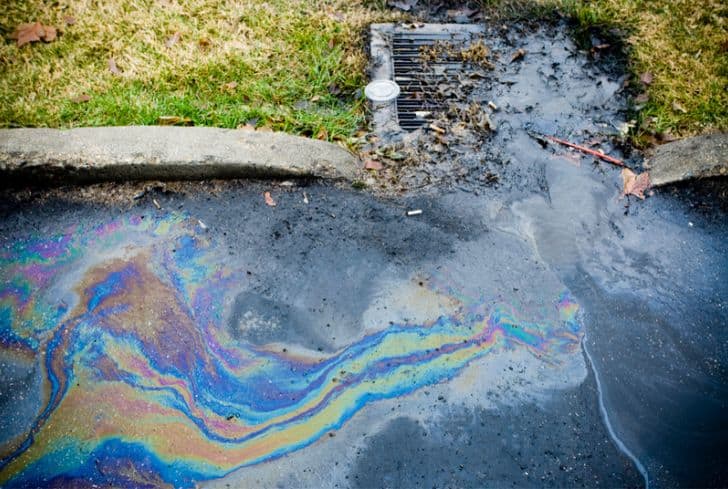
Accidents do happen, and spills might occur when working with fluids like gas. You could cause a spill when adding gasoline to the mower or putting it in a container for your car. But how long is spilled gas flammable?
Since you need to know how fast you should clean up, we tell you how long gasoline stays flammable after it has spilled. Additionally, you’ll learn how long gas evaporates if dried-up gasoline might catch fire and how long its smell will stay after the spill. The article will tell you more if you’ve ever wondered how gasoline affects grass. Ultimately, we tell you what to do if you spill gas.
Read: Is Perfume Flammable?
How Long is Gasoline Flammable When Spilled?
After a gas spill, the gasoline will still be flammable for about 15 minutes. However, the duration will also depend on the amount and the type of surface the gas spilled on. As long as gasoline is still smelling, it will continue to be flammable. However, you should immediately clean up a gas spill because it poses a fire risk.
Even if the spill happened indoors, it’s still possible that it seeped into some other materials, including clothes or concrete. You must exercise extreme caution because gasoline can catch fire if it comes into touch with an ignition source, and gasoline vapors can also catch fire.
A fire could ignite if electrical equipment is used if the spilled gasoline is still on the ground. Electric sparks can come into contact with gasoline, igniting a potentially hazardous fire.
Can Dried up Gasoline Catch on Fire?
Gas that has dried out is still flammable, but the heating process is slower. You’ll need a lot of heat and a spark to start it. Two points will explain this occurrence: the pressure in the system decreases, and there are fewer molecules per volume of gas. But the dried-up gas can still ignite if you smell the gasoline.
It indicates that all the gasoline has evaporated if you can no longer smell it. Consider the type of surface carefully. If the item is made of wood or cloth, it’s possible that it penetrated the material profoundly and that only the top layer has dried.
When gasoline is spilled in very porous materials, the odor of the fuel may linger even after the vapors have evaporated. Cleaning the material is the only way to remove the gasoline entirely.
The two reasons mentioned in the first paragraph of this sub-section clarify why trying to light gasoline after prolonged storage in a container may be more challenging. The gasoline has dried out to the point where air makes up most of its volume.
How Long Does It Take Spilled Gas to Evaporate?
Gas evaporates quickly, mainly when the spill happens outside or in the open air. It could take 90 minutes or the entire day, depending on the surface. 1.6 liters of gasoline evaporate every minute. Gasoline vapor is lighter than air and will ignite quickly if an ignition source is close.
If the gasoline is absorbed by a porous surface, such as concrete pavement, it will evaporate faster. Fabrics absorb gas because they are porous and combustible; if you put a flame near them, they will catch fire. Other porous materials, such as wood, have internal pores that can store gasoline, making them more flammable.
Gasoline has a hard time penetrating other surfaces like glass or steel. These surfaces are unable to absorb the gasoline. Such a surface is made easier to ignite because there is so much gasoline.
The ventilation and weather will both impact how long gas vaporizes. On a hot day, as opposed to a chilly day, gas will evaporate more quickly. In comparison to enclosed spaces, open spaces allow for faster gas evaporation.
The time it takes for the gas to evaporate depends on the spilled amount. It will take less time if the amount spilled is small than if it is high.
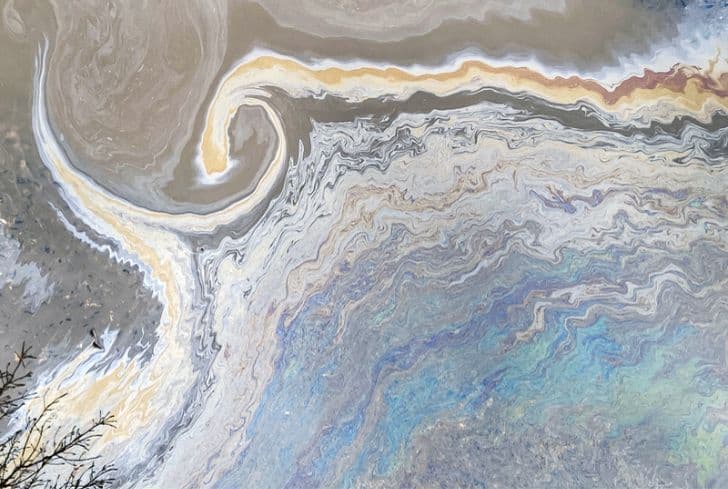
How Long Will the Smell of Gasoline Last?
The smell of split gasoline will continue as long as it hasn’t evaporated. The surface of the gasoline spill will affect how quickly it evaporates. The smell of gasoline can linger long on an absorbent surface like cotton. If not washed, some surfaces, like fabric, will continue to smell even after drying.
It isn’t hard to identify the smell of gasoline. It is weighty and has a persistent stench that can be irritating, especially if you have to smell it for a while.
However, on a surface such as metal or glass, the gasoline will evaporate and not leave any smell behind. Gasoline has 3 to 4 times heavier vapors than air and can travel greater distances along the ground. A nearby open flame can ignite these vapors.
Is Spilled Gasoline Flammable?
If the gasoline leak occurs in a controlled area, it is highly flammable. It will evaporate more slowly, increasing the risk of a fire. A spill in a small area will likely evaporate quickly and may not burn for very long. As the gasoline evaporates, an oily residue is left behind.
The flammability of gasoline when spilled depends on its type. Impure gasoline consists of petrol carbon and other additives. Impure gasoline becomes considerably more flammable due to these additional components. Just be aware that spilling this fuel poses more significant risks.
Read: Is Blood Flammable?
Will Spilled Gasoline Kill Grass?
Gasoline spills kill the grass. Even if you try to wet the grass in water to remove the gasoline, it won’t be saved. Within the first twenty minutes following a spill, grass burns. The grass is also wholly dehydrated. The affected grass becomes darker with time, and the leaf roll worsens. The grass will have turned brown in 16 hours.
You should use a herbicide instead of gasoline just in case you’re trying to get rid of the grass. A gasoline spill will affect not only grass but other plants and weeds. It will also impact the health of the soil around that particular area, and you might be unable to grow any plants for some time.
A gasoline spill will also kill microbes and other soil microorganisms that carry plant nutrients. Depending on the amount and the type of soil, spilled gasoline will contaminate groundwater.
Will Spilled Gasoline Ignite?
Gasoline spills can ignite very quickly. Although gasoline has a low ignition point in the presence of a flame, it won’t spontaneously ignite until temperatures of roughly 500°F (260°C) are reached. It will catch fire when exposed to an ignition source for more than 30 minutes. The likelihood that the gas will catch fire and spread as it remains on the ground increases with time.
Don’t leave a gas spill alone in the hopes that it will eventually evaporate for safety concerns. Never let it dry on its own, and always clean it properly.
What Should You Do if You Spill Gasoline?
You should clean gasoline up as fast as possible when you spill it. Gasoline is highly flammable and can cause fire easily. If it spills on the floor, it could cause someone to fall and hurt themselves. Additionally, the smell of gasoline can linger for a very long period.
It will be simpler to prevent fires and associated accidents and damage the sooner you can mop up the gasoline that has spilled. To make sure that your home is not at risk of a fire, always remember to do it correctly and thoroughly.
Use neither a sponge nor a vacuum. Using an absorbent substance that you can safely dispose of is the most effective option. When you spill gasoline, you can take the following actions:
- Stop the spill’s source right away. Put the fuel can upright, cap it carefully, and turn off the gas pump.
- Put some things in place to stop the gasoline spill from spreading. Never use a material you cannot dispose of because anything you use will have to discard. Be quick, so the spill does not get near a heat source, such as an oven or an electrical outlet. To cover something you want to keep safe, use a plastic tarp.
- If the location is enclosed, open adjacent windows to let fresh air through. The powerful fumes from gasoline are harmful to breathe in.
- To absorb the gasoline spill, add baking powder or kitty litter. Before cleaning up the spill, cover the area and give it an hour to rest.
- You can use a disinfectant if the gas smell doesn’t go away. Before using the disinfectant, ensure the spill has been cleaned up to avoid the chemicals reacting and having a bad reaction.
Conclusion
Never assume that gas is inflammable just because it has spilled. The gas is still flammable as long as it emits a smell.
It is important to remember that even though gas typically evaporates within 15 minutes, the amount and surface affect how long it takes to evaporate. It could take longer for gas to evaporate once it has been spilled on a porous surface.
Gasoline that has dried out is still flammable, but it will take longer to ignite. Avoid spilling gasoline on grass since it will instantly kill it and may impact other plants and living things.

